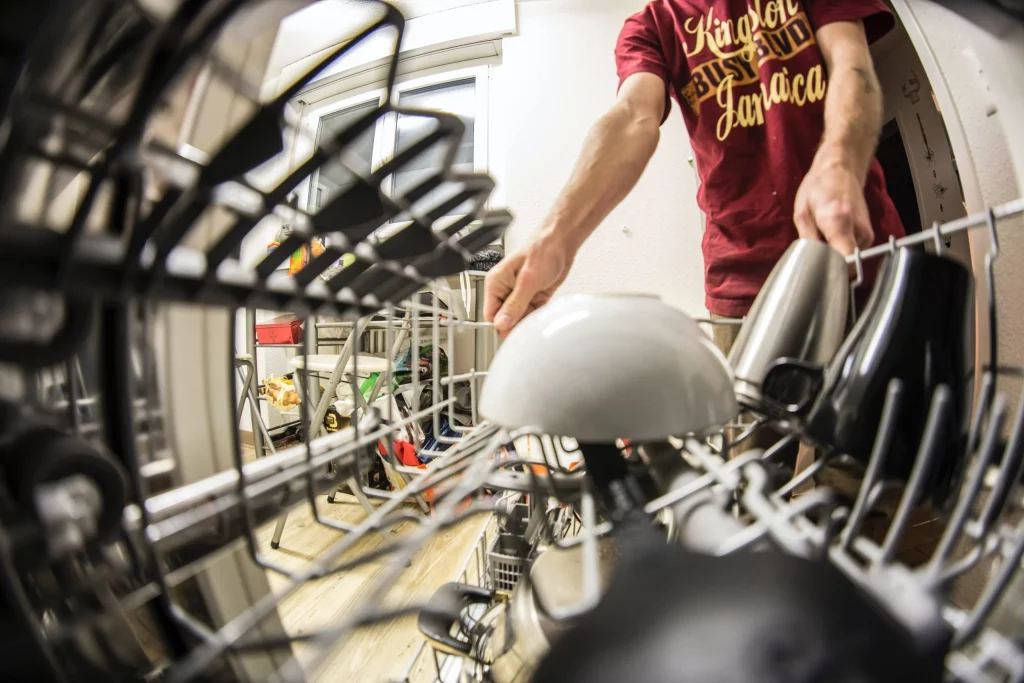The other day I was gazing lovingly at my dishwasher, as one does, and I had an epiphany: dishwashers are the unsung heroes of our kitchens. Yes, indeed! While I once accidentally washed my cell phone (who puts a phone on a kitchen counter anyway?), it made me realize how this magnificent contraption has quietly been saving our hands, time, and sanity for years.
I mean, let’s be honest, have you ever tried washing a week’s worth of dishes by hand after hosting a dinner party? If you have, you’re stronger than me! So, before you proceed, a quick question: How many of you have named your dishwasher?
A dishwasher doesn’t just clean dishes. It washes away the chaos of the day.
Unknown
Dishwasher Facts
If you are a massive nerd like me, I created a quiz at the bottom of the page, so pay close attention to the facts that you are going to read.
- Dishwashers were first invented in the 1880s by Josephine Cochrane.
- The first hand-powered dishwasher was exhibited at the 1876 Centennial Exposition in Philadelphia.
- Energy Star-rated dishwashers use less energy and water, making them more environmentally friendly.
- Dishwashers operate with warm water, usually ranging from 130 to 170°F (54 to 77°C), to ensure dishes are sanitized.
- Contemporary dishwashers often come with several cleaning cycles, from speedy washes to intense cleaning.
- European models of dishwashers are generally more compact compared to the American versions.
- For utmost efficiency in water and energy use, it is advisable to operate dishwashers only when fully loaded.
- Dishwashers can be more efficient in terms of water usage compared to manual washing, utilizing as little as 3 gallons per cycle.
- A number of dishwashers include a rinse aid compartment to enhance drying and minimize water stains.
- Premium models might boast stainless steel inside compartments, enhancing the drying process.
- Hard water might lead to the accumulation of minerals in dishwashers, hindering their functionality.
- Products like Jet Dry are helpful in avoiding streaks and residues on the dishes.
- The spinning components in a dishwasher, responsible for water distribution, are known as spray arms.

- Some dishwashers come with soil sensors that can adjust the cycle length based on how dirty the dishes are.
- Pre-rinsing dishes can sometimes waste more water than just letting the dishwasher handle the dirt.
- Modern dishwashers have filters that should be cleaned regularly for optimal performance.
- Dishwashers can be integrated into cabinetry with a panel-ready design for a seamless look.
- Drawer dishwashers are a newer design, offering two separate wash zones in a single unit.
- Many dishwashers offer a delay start option, allowing users to run the dishwasher during off-peak hours.
- Using the correct type and amount of dishwasher detergent is crucial for the best results.
- There are special cleaners available to remove grease and limescale from the interior of dishwashers.
- Dishwasher salt can be used in some models to soften hard water, improving wash results.
- Third racks or cutlery trays are available in some models for better utensil cleaning.
- Dishwashers should be leveled during installation to prevent leaks and ensure proper drainage.
- Air gaps are sometimes installed to prevent dirty water from siphoning back into the dishwasher.
- The average lifespan of a dishwasher is 7 to 12 years.
- Drying methods in dishwashers vary: some use heating elements, while others use condensation drying.
- Some dishwashers feature sound insulation to operate more quietly, rated in decibels (dB).
- Smart dishwashers can be controlled via smartphone apps or integrated with home automation systems.

- Several up-to-date dishwashers incorporate child lock mechanisms to avoid accidental disruptions.
- Certain versions provide sanitization cycles, eliminating a substantial quantity of bacteria.
- Quick or expedited cycles are made to clean dishes swiftly but may consume extra energy.
- The dish rack configurations are diverse across brands, with some allowing adjustable settings for convenient placement.
- Stainless steel interiors are superior in maintaining warmth compared to their plastic counterparts, aiding in the quicker drying of dishes.
- Using a dishwasher is effective in minimizing bacterial exposure as opposed to washing dishes by hand.
- Dishwashers in some models are equipped with a waste disposal feature to manage larger remnants of food.
- Dishwashers’ door equilibrium features are essential in preventing the abrupt dropping or shutting of the door.
- Some designs are fitted with internal LED illumination to facilitate the process of loading and unloading.
- Consistent inspection of the sealing rubber around the door of the dishwasher helps in avoiding potential leakage.
- Water softening devices are crucial in prolonging the dishwasher’s durability in regions with exceptionally hard water.

- Tablet detergents often combine cleaning agents, rinse aids, and other additives for convenience.
- Regular maintenance, such as checking the spray arms for clogs, can improve dishwasher efficiency.
- Half-load options are available in some dishwashers for washing smaller loads efficiently.
- Auto door-opening features in some models help dishes dry faster by letting out steam at the end of a cycle.
- Dishwashers are available in various colors and finishes, including stainless steel, black, and white.
- Portable dishwashers are on wheels and can be connected to a sink when needed, making them ideal for spaces without built-in units.
- Most dishwashers are 24 inches wide, but 18-inch models are available for smaller spaces.
- Glass protection technology in some dishwashers ensures delicate glasses are cleaned gently.
- The Eco cycle in many dishwashers is designed for energy efficiency, using less water and power.
- Some dishwashers have built-in water softener systems to combat the effects of hard water on washing.
- Dishwashers Use More Water Than Hand-Washing
While it might seem like filling a sink or two with water is less wasteful, many modern dishwashers are incredibly efficient. They can clean a full load with less water than it takes for hand washing. - You Need to Pre-Rinse Dishes Before Loading
While this used to be the case with older models, today’s dishwashers are powerful enough to handle the dirt. Pre-rinsing not only wastes water but also reduces the detergent’s efficiency, as manufacturers design it to cling to food particles. - Dishwashers are Rough on Delicate Items
Many dishwashers now have gentle cycles and settings specifically for fragile items. So, you can often wash grandma’s china or your favorite wine glasses safely. Just make sure you place them securely. - Dishwashers are Energy Vampires
On the contrary, energy-efficient dishwashers can use less energy than repeatedly heating water for hand washing. Look for the Energy Star label for the most efficient models. - You Can’t Mix Metals in the Dishwasher
Back in the day, silver and stainless steel could react, causing tarnishing. But modern detergents and dishwashers have largely addressed this issue. Still, for peace of mind, keep different metals separated or hand wash special pieces. - What is a dishwasher?
It might amaze you, but a dishwasher is exactly what the word says. A machine that washes dishes. Instead of hand-washing, you load them in, add detergent, and it does the work for you. - How long does a dishwasher cycle take?
Dishwasher cycle times vary but typically range from 1 to 2 hours. Many models offer quicker cycles for lightly soiled dishes that can finish in 20-30 minutes. - Who invented the dishwasher?
Josephine Cochrane invented the first practical dishwasher in 1887. She showcased it at the 1893 Chicago World’s Fair. - Is the dishwasher connected to the sink?
Yes, people usually connect dishwashers to the sink’s water supply and drainage, drawing in hot water and draining used water via the sink. - Is the dishwasher enough to sterilize bottles?
Dishwashers can clean well and use hot water, but they might not sterilize like boiling does. For baby bottles, always follow manufacturer guidelines or use the “sanitize” cycle if available.
Dishwasher Myths

There is a common myth that dishwashers use more water. Is this true? Let’s see the answer to this and four more common myths about them.
No products found.
Dishwasher FAQ

It’s funny because the most asked question about dishwashers is: What is one? So let’s answer this and some other questions.
Dishwasher Quiz

It’s time to prove you are a nerd for any gadget available out there. Remember that if you get 0 out of 10 correct, your dishes might stage a dirty protest in your kitchen.
Conclusion
So, there you have it, a deep dive into the world of dishwashers! I bet you didn’t think you’d be chuckling about appliances today, did you?
But hey, in a world full of tech talk, isn’t it refreshing to appreciate our little friend in the kitchen? Quick question: Ever named your dishwasher? If not, any ideas now? Let me know in the comments.


